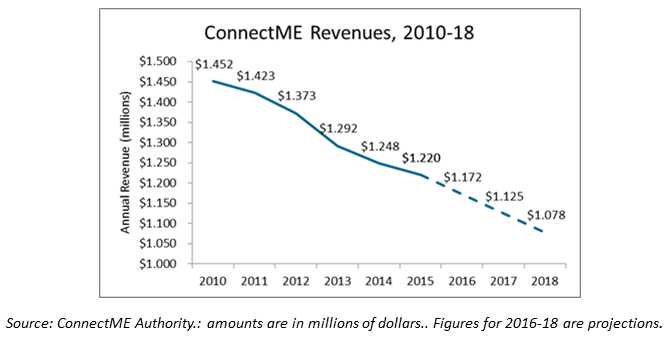If it took a while for your internet service provider (ISP) to load this page onto your computer, you’re not alone. Maine has some of the slowest broadband connections in the nation.
High-speed internet is rapidly becoming a key driver of economic growth, nurturing high-tech jobs, allowing individuals to telecommute, and opening up new opportunities in health care and education. With Maine standing at, or near, the bottom for internet access speed and availability nationwide, the state risks being left behind and poorly positioned for the new economy.
A new report from Ookla Speedtest, an internet speed-rating agency, shows Maine has the slowest download speeds for fixed broadband, at 21.36 Mbps (Megabits per second), and the third slowest speeds for mobile broadband (12.92 Mbps). These speeds clocked in at half and two-thirds, respectively, of the U.S. average.
Similarly, Maine’s ConnectME Authority, the agency tasked with expanding access to broadband statewide, found that while 97% of Mainers have access to “basic” broadband services (speeds of 1.5 Mbps), only 12.5% of households and businesses have access to high-speed broadband (speeds of 10 Mbps or higher). While basic broadband is adequate for web browsing, email, and some streaming video, it precludes functions like movies-on-demand, music streaming, and even rudimentary telemedicine. More advanced activities—remote education, cutting-edge telemedicine, biomedicine research, or satellite imaging―require even faster speeds.
ConnectME also highlighted demographic disparities between Mainers. Seniors, Mainers without a high-school diploma, and those living in poverty are most likely not to have any broadband internet service. These are people who would benefit most from telemedicine, remote education, and new employment and training opportunities offered through internet access. However, these are the populations that the biggest barriers to broadband access in Maine―the high cost of internet service, and its lack of availability in Maine’s rural areas—affect most.
As for high-speed broadband, Maine is a long way from achieving success. Competition is severely limited; many Mainers have only one broadband provider available to them. Maine’s low population density gives ISPs little incentive to invest in infrastructure.
A patchwork of towns across Maine is seeking to fix this broken market by providing their own high-speed municipal broadband. However, local projects face cost obstacles. Rockland, the first Maine municipality to offer fiber service to businesses, voted down a similar residential scheme in the face of rising property taxes. The legislature designed ConnectME Authority to offer support for such initiatives, but its funding, a fee assessed on landline phones, has dropped precipitously—at a time when the need has never been greater.

The legislature needs to invest more in high-speed broadband infrastructure. It can do this through bonding. It can also increase the surcharge on landline phones that funds the ConnectME Authority’s municipal grants and expand it to include cellular phones.
High-speed internet has the power to transform Maine’s economy. It can make education and health care more accessible to rural residents and low-income families. Maine is falling further behind the rest of the nation. State support for wider broadband availability and higher internet speeds is an investment that will deliver dividends that will benefit all Mainers.



